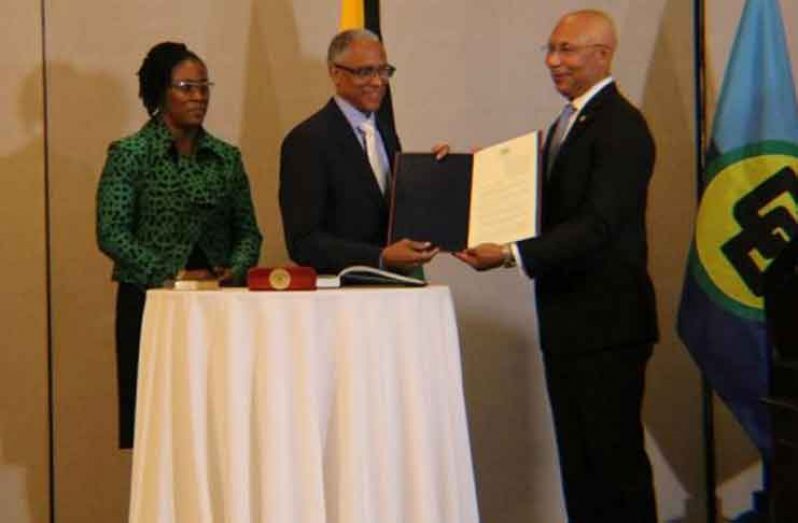…new CCJ President courts CARICOM states’ full support
By Svetlana Marshall in Jamaica
THOUGH honoured to be sworn in as the third President of the Caribbean Court of Justice (CCJ), Justice Adrian Saunders said it is regrettable that some member states of the Caribbean Community (CARICOM) continue to doubt the ability of the institution to be effective and efficient.
Moments after taking the oath of office before Jamaica Governor- General Sir Patrick Allen at the Hyatt Hotel in Montego Bay, Jamaica, on Wednesday, the new CCJ President said member states have no good reason to doubt the CCJ’s ability to grasp full responsibility for interpreting and applying the law as he expressed his disappointment.
“This is an obligation that is naturally assumed by all civilised peoples. It is remarkable and regrettable that there are still some who have misgivings about the Region’s capacity to discharge that responsibility in an efficient and effective manner,” Justice Saunders told regional leaders present at the swearing-in ceremony.
Guyana, Belize, Dominica and Barbados are the only four Caribbean countries that have made the CCJ their final court. The others continue to use the Privy Council as their final court of appeal as against the CCJ. “Over the last 13 years, the Caribbean Court of Justice has demonstrated its mettle, its high calibre speaks for itself, but even beyond the jurisprudence, through bodies like the Caribbean Association of Judicial Officers, the Caribbean Academy of Law, the Jurist Project among others, the CCJ invests time and resources in making the administration of justice more efficient and improving the quality of judges in the Region,” Justice Saunders said.
He, however, expressed hope that other member states would buy into the CCJ as done with other institutions such as the University of the West Indies, the Caribbean Development Bank and the Caribbean Examinations Council. Justice Saunders replaces Sir Dennis Byron as President of the CCJ. In his address, Sir Byron in handing over the presidency to Justice Saunders, expressed confidence in his ability to lead, noting that the court has been outstanding it in its performance.
“The judicial work of the court has been effective. We have no backlogs and I think it has also developed Caribbean jurisprudence significantly. The ancillary institutions, the regional judicial and legal services commission and the trust fund are healthy and fully functional,” Sir Byron said.
Noting that the institutional framework has stood the test of time, Sir Byron said Caribbean nationals can be justifiably be proud of it. “However, as I have often expressed, excellence is not a state that we reach, it is the process of continuously trying to be and to do better and it may well be that after 15 years of experience, we will continue to find additional needs to improve and strengthen all of these institutions,” he added.
CARICOM Secretary- General Irwin LaRocque, in offering congratulations to Justice Saunders, said that he has made history in his own right by becoming the first graduate of the Region’s legal education system to be elevated to the Office of President of the CCJ.
“This represents a milestone in the evolution of our judicial history and sends a positive message to all, not only about the standards at our legal education institutions, but also about the confidence which the Regional Judicial Legal Service Commission has in the quality of the graduates. This truly marks the beginning of a new era,” Ambassador LaRocque said.
The CARICOM Secretary- General also used the opportunity to express gratitude on behalf of the Community to Sir Byron, noting that he has presided over judgements with far-reaching effects.
“Thank you, Sir Dennis, on behalf of the Caribbean Community for your most significant contribution to the advancement of the integration process and regional jurisprudence,” the ambassador said.
Justice Saunders has been a judge at the CCJ since 2005 and contributed immensely to the administration and judicial functions of the court. Justice Saunders is also Chairman of the Caribbean Association of Judicial Officers (CAJO) and the Course Director of the Halifax-based Commonwealth Judicial Education Institute’s CJEI’s Intensive Study Programme.
He is also one of the institute’s directors. He co-authored the book, Fundamentals of Caribbean Constitutional Law and is a contributing editor of the Caribbean Civil Court Practice. In April 2018, he was appointed to the Advisory Board of the Global Judicial Integrity Network by the United Nations Office on Drugs and Crime (UNODC).
He holds a Bachelor of Laws degree from the University of the West Indies (Cave Hill) in 1975 and the Legal Education Certificate from the Hugh Wooding Law School in Trinidad & Tobago in 1977. He was called to the Bar of St. Vincent and the Grenadines in that same year. He worked with Sir Dennis at the Eastern Caribbean Supreme Court and was later reunited with him in 2011, when Sir Dennis was appointed President of the CCJ.
Among regional leaders present at the opening ceremony were Chairman of CARICOM, Prime Minister of Jamaica, Andrew Holness and Prime Minister of St. Vincent and the Grenadines, Ralph Gonsalves.



.jpg)









